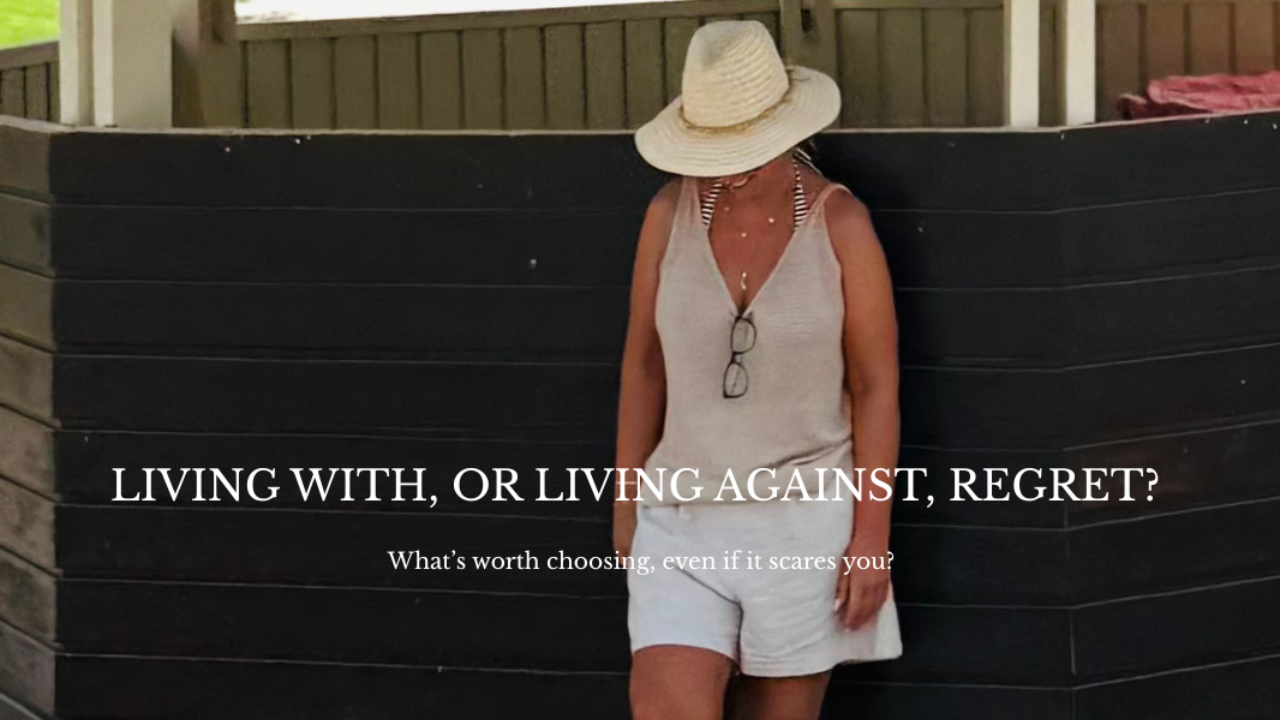Living With, Or Living Against, Regret?
Sep 01, 2025
Regret is one of those words that creeps up quietly in midlife.
Sometimes it’s loud... the friend who says, “I wish I’d left that job ten years ago.” The colleague who wonders, “What if I’d started my own business instead of playing it safe?” The late-night confession of someone who didn’t say yes, or didn’t walk away, when they had the chance.
Other times it’s more subtle. It shows up in a restless feeling, the nagging sense that life is fine, but not quite yours. That somewhere along the way, you’ve traded the boldness of youth for the safety of routine.
And then there’s the other version: regret as a calculation.
That’s where I find myself. I'm not standing at the end of life, but I am standing at the end of certain chapters.
Careers. Locations. Relationships that shaped me but don’t define me anymore. And with every decision now... where to live, what to build, what to invest energy in... the question isn’t what’s easiest? It’s what will leave the least regret?
But here’s the question that nags at me…
Is that even possible?
The Two Faces of Regret
When people talk about regret, they usually mean the heavy kind. The regrets that feel like missed trains:
-
“I wish I had spoken up.”
-
“I should have left sooner.”
-
“I could have tried, but I didn’t.”
These are the regrets of inaction. They linger because they’re irreversible, because there’s no “undo” button, and because the older we get, the more final those missed opportunities feel.
But there’s another type of regret. A more intentional kind. It looks like the choices I'm making right now... trying to live in ways that prevent me from reaching the end of my life with too many “I wish I hads.”
It’s not about undoing the past. It’s about shaping the future.
Yet even in that, I wonder: am I trying to eliminate regret, or am I simply protecting myself from it? Am I brave, or am I just cautious in disguise?
Why Midlife is the Flashpoint
Psychologists have studied regret for decades, and one thing is consistent: it spikes in midlife. (Don't worry, I'm not going to get all researchy on you!)
Career paths that once seemed secure can suddenly feel like cages. Parenting or relationships change, and so do our priorities. Health challenges or the loss of loved ones remind us that time is not an endless resource.
By our 40s and 50s, the “someday” list starts to feel like a ticking clock. And with that awareness comes the temptation to measure every decision against the shadow of future regret.
But here’s the paradox: the more aware we are of regret, the harder it becomes to live without it.
The Paradox of Choice
The more options we have, the more likely we are to be dissatisfied, because we can imagine all the alternatives we didn’t take.
Midlife gives us that paradox in high definition.
-
If you stay in the job, you wonder what might have happened if you left.
-
If you leave, you sometimes long for the stability you abandoned.
-
If you say yes to love, you risk heartbreak.
-
If you say no, you risk loneliness.
Every path has a shadow. Every decision carries a parallel life you’ll never live.
So maybe the real question isn’t “Can I live without regret?” but “Which regrets am I willing to carry?”
Is a Regret-Free Life Possible?
Here’s the uncomfortable truth: you can’t live without regret. Not fully.
-
You can’t live every possible version of your life. Some regrets are inevitable simply because you can’t do it all.
-
Regret isn’t always the villain we make it out to be. Sometimes it’s a signpost, pointing to what mattered to us all along.
-
And often, regret teaches us more than success ever did.
In fact, research shows that people’s biggest regrets aren’t about the things they did, but the things they didn’t. Missed chances. Unspoken words. Roads not taken.
So maybe the goal isn’t to be regret-free.
Maybe the goal is to be regret-light. To know that whatever else, you chose intentionally, not sleepwalked through life.
Reframing Regret
This is the part where midlife can shift from a crisis into an awakening.
Instead of being paralysed by regret, we can use it as feedback.
Instead of letting it drag us down, we can let it highlight what matters.
For me, that looks like:
-
Refusing to settle in relationships.
-
Choosing courage over comfort in business.
-
Planning a future that feels like it belongs to him and me, not anyone else’s blueprint.
These decisions don’t guarantee a regret-free future. But they do mean that if regret shows up, it won’t be because I abandoned myself.
Closing Reflection
So maybe it’s time to stop asking “How do I avoid regret?”
Maybe the better question is:
“What’s worth choosing, even if it scares me?”
Because that’s the version of regret we can live with.
And the version of life we won’t sleepwalk through.

